“We must reaffirm in every generation the lessons of justice and charity that Dr. King taught with his unflinching determination, his complete confidence in the redeeming power of love, and his utter willingness to suffer, to sacrifice, and to serve. We must, and we can, all be drum majors for justice. That is our duty and our glory as Americans. On Martin Luther King, Jr., Day and every day let us unite in prayer and promise to be true to the American Dream he loved and renewed.”
~President Ronald Reagan
==============================
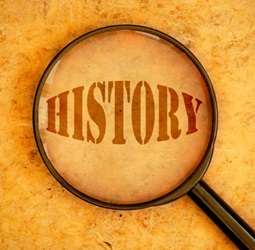
==============================
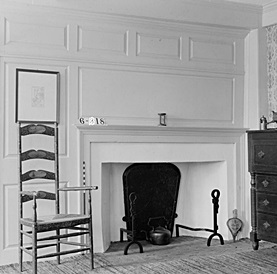
1783 – Gen. George Washington issued his farewell address to the Army.
Washington, then at Rockingham – his final military headquarters – near Rocky Hill, New Jersey, released his Farewell Orders issued to the Armies of the United States of America to the Philadelphia newspapers for nationwide distribution to his furloughed men.
In the farewell written in the room shown above, Washington thanked the officers and men for their assistance and reminded them that “the singular interpositions of Providence in our feeble condition were such, as could scarcely escape the attention of the most unobserving; while the unparalleled perseverance of the Armies of the United States, through almost every possible suffering and discouragement for the space of eight long years, was little short of a standing Miracle.”
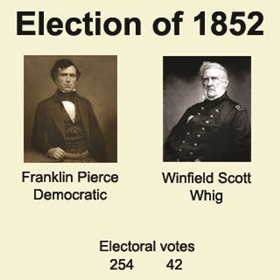
1852 – Franklin Pierce became the 14th President of the United States.
The Whig Party cast aside incumbent President Millard Fillmore in favor of a war hero; Winfield Scott, a Virginian who was at the time the Commanding General of the U.S. Army.
Democrats couldn’t decide between Michigan Senator Lewis Cass and former Secretary of State James Buchanan, leading to the nomination of compromise choice Franklin Pierce, a former Senator from New Hampshire.
The campaign was very personal, with both candidates accusing the other of being a drunk. Scott was accused of being pompous, while Pierce – a recovering alcoholic – was accused of collapsing and being a coward during the Mexican American War.
Pierce won in a landslide. Scott won only the states of Kentucky, Tennessee, Massachusetts, and Vermont.
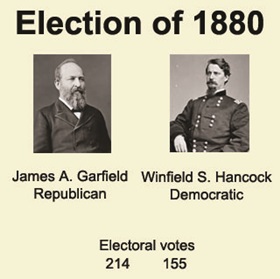
1880 – James Garfield became the 20th President of the United States.
It took 36 ballots at the Republican convention for Ohio Congressman James Garfield to secure the party’s nomination over former President Ulysses S. Grant.
Democrats chose Winfield Scott Hancock, a former Civil War general, as their candidate.
One of the main issues of the election campaign was whether to impose higher tariffs on other countries.
Republicans said yes and Democrats said no – although Hancock, attempting to strike a moderate stance, said “the tariff question is a local question,” a statement that was at odds with the Democrats’ platform and suggested that Hancock did not understand the issue.
Voters showed their interest in the election by turning out in record numbers; 78 percent of eligible voters cast a ballot.
Garfield won the election, barely, by less than 2,000 popular votes, although the Electoral College results provided a much wider edge.
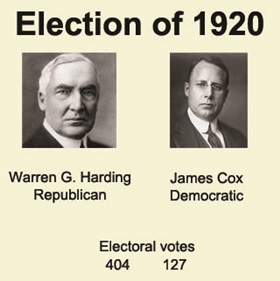
1920 – Warren G. Harding became the 29th President of the United States.
Senator Warren G. Harding of Ohio clinched the Republican nomination on the tenth ballot as a compromise candidate after General Leonard Wood and Illinois Governor Frank Lowden failed to ignite delegates at the Republican convention.
Democrats nominated Ohio Governor James Cox (whose running mate was 38-year old Franklin D. Roosevelt, the Assistant Secretary of the Navy).
The campaign was primarily a referendum on the Woodrow Wilson presidency. Cox fully supported Wilson, while Harding’s campaign slogan of “A Return to Normalcy” was aimed at voters disillusioned with Wilson.
Although Cox campaigned enthusiastically (while Harding ran mostly a front porch campaign), his efforts didn’t add up on Election Day.
Harding won a landslide victory, beating Cox by 7 million popular votes and an electoral tally of 404-127.
The election was also notable because it was the first in which American women had the legal right to vote in all 48 states.
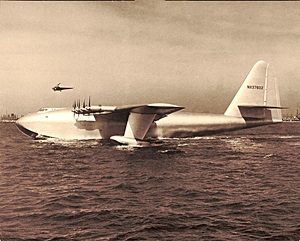
1947 – Howard Hughes piloted his huge wooden airplane, the Spruce Goose, on its only flight, which lasted about a minute over Long Beach Harbor in California.
Hughes and a small engineering crew fired up the eight radial engines for taxi tests and thrilled thousands of on-lookers with an unannounced flight.
With Hughes at the controls, the flying boat lifted 33 feet off the surface of Los Angeles Harbor and flew one mile in less than a minute at a top speed of 80 miles per hour before making a perfect landing.
After disgruntled U.S. Senator Owen Brewster of Maine dubbed it a “flying lumberyard,” the Spruce Goose nickname (although it was made almost entirely of birch) was coined — Hughes despised the name.
The Spruce Goose never flew again. It is now on display at Evergreen Aviation & Space Museum in Oregon.
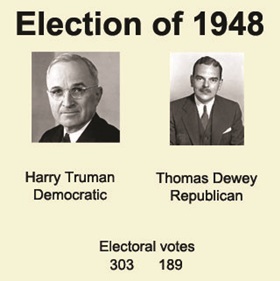
1948 – President Harry Truman won reelection in one of the greatest election upsets in American history.
Republicans selected New York Governor Thomas Dewey (who had been defeated in 1944 by Franklin Roosevelt) after General Dwight Eisenhower refused to be considered.
At the time, Truman was deeply unpopular, having clashed with leaders of Congress and failed to live up to many people’s expectations, following in the footsteps of the hugely popular FDR.
Republicans had taken control of both houses of Congress and a majority of state governorships during the 1946 mid-term elections, and the public opinion polls showed Truman trailing Dewey, sometimes by double digits.
Furthermore, some liberal Democrats had joined Henry A. Wallace’s new Progressive Party, and party leaders feared that Wallace would take enough votes from Truman to give the large Northern and Midwestern states to the Republicans.
Dewey’s campaign was lackluster; Truman’s was not.
He ran a coast-to-coast train campaign, covering 22,000 miles and gave ten speeches a day.
All the hard work looked to be in vain as polls showed Truman trailing Dewey as October ended.
On election night, most of America went to sleep believing that Dewey had won the election.
They were wrong.
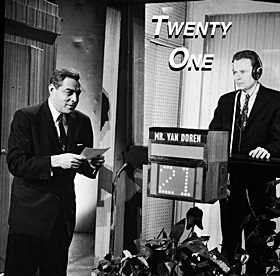
1959 – Charles Van Doren admitted to a House subcommittee that he had the questions and answers in advance of his appearances on the TV game show Twenty-One.
In January 1957, Van Doren entered a winning streak that ultimately earned him $129,000 (the equivalent of $1.2 million today) and made him famous, including an appearance on the cover of Time magazine.
After his defeat in February 1957, he was offered a three-year contract with NBC worth $150,000.
When allegations of cheating were first raised, Van Doren denied any wrongdoing, saying, “It’s silly and distressing to think that people don’t have more faith in quiz shows.”
However, on this date, he finally admitted to the House Subcommittee on Legislative Oversight that he had been given questions and answers in advance of the show.
“I deeply regret this, since I believe nothing is of more vital importance to our civilization than education.”
Van Doren was dropped by NBC and resigned from his post as an English instructor at Columbia University.
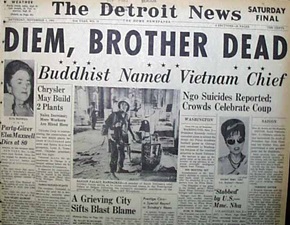
1963 – South Vietnamese President Ngo Dinh Diem was assassinated in a military coup.
The assassination marked the culmination of a successful coup d’état on November 1. The coup was the culmination of nine years of autocratic and nepotistic family rule in South Vietnam. The Army of the Republic of Vietnam had launched an overnight siege on Gia Long Palace in Saigon.
When rebel forces entered the palace, Diem and his adviser and younger brother Ngo Dnh Nhu were not present, but the brothers agreed to surrender and were promised safe exile.
After being arrested, they were instead executed in the back of an armored personnel carrier by ARVN officers on the journey back to military headquarters.
I Can Be A Nice Guy Factoid: Although the rebels claimed the brothers committed suicide (as shown in the newspaper), I have seen the death photos and there is no way in hell they could have shot themselves that many times.
I spared you the photos.
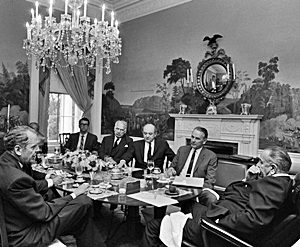
1967 – President Lyndon B. Johnson and a group he dubbed “The Wise Men” concluded that the American people should be given more optimistic reports on the progress of the Vietnam War.
The war was not going well, but the main problem, the group of “geniuses” decided, was not with the war itself but with widespread public and political misperception about how it was going.
As far as the White House and the Wise Men were concerned, the problem was principally one of public relations.
Several of the participants urged that Ellsworth Bunker, the ambassador to South Vietnam, and Gen. William Westmoreland be brought home to allay the public’s misconceptions.
Johnson jumped on the idea.
Westmoreland and Bunker were summoned to Washington to sell the war – or at least the idea that things were going very well indeed – a public relations push that included prominent speeches, appearances on television, and testimony before congressional committees.
On Nov. 21, at a speech before the National Press Club, Westmoreland offered the big brass ring.
He was “absolutely certain” the United States was winning a war of attrition, and the strength of the Viet Cong was “declining at a steady rate. The war has entered a new phase when the end begins to come into view.”
Ten weeks later, American forces were stunned by the Tet offensive, a major coordinated strike across all of South Vietnam, including attacks on 44 of the country’s 50 largest cities.
In the first quarter of 1968, the Americans would suffer over 4,700 combat deaths.
Dissenting Voice Factoid: It should be pointed out that there was one rational voice in the room.
As the “Wise Men” were leaving the meeting with Johnson, George Ball, the former undersecretary of state, snapped at his colleagues.
“I’ve been watching you across the table. You’re like a flock of buzzards sitting on a fence, sending young men off to be killed. You ought to be ashamed of yourselves.”
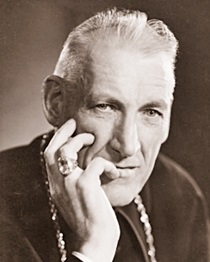
1970 – Richard Cardinal Cushing died from cancer at the age of 75.
Having been made a cardinal in 1958, Cushing served as Archbishop of Boston from 1944 to 1970. In that capacity, he built useful relationships with Jews, Protestants, and institutions outside the usual Catholic community.
He was a close friend of the Kennedy family. He officiated at the marriage of John F. Kennedy and Jacqueline Lee Bouvier in 1953, and gave the prayer invocation at Kennedy’s inauguration in 1961.
The Cardinal also celebrated President Kennedy’s funeral Mass in 1963 at St. Matthew’s Cathedral in Washington, D.C.
But there were problems that can’t be dismissed.
Cushing was archbishop during some of the sexual abuse incidents in the Boston archdiocese, revealed publicly after his death.
The notorious child-molesting priest John Geoghan committed many of his crimes, as did others, during Cushing’s time as archbishop.
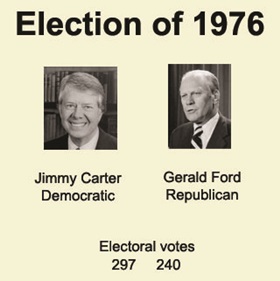
1976 – Jimmy Carter became the 39th President of the United States.
The forced resignations, separately, of both President Nixon and Vice President Agnew, left President Gerald Ford the first president ever not elected to national office. Therefore, he did not have the support that most incumbent Presidents enjoyed.
Governor Ronald Reagan of California chose to challenge Ford for the nomination and the two arrived at the convention with nearly the same number of delegates.
Ford, however, managed to carry the convention on the first ballot by accepting Senator Robert Dole of Kansas – favored by the right-wing of the party – as his running mate.
Former Georgia Governor Jimmy Carter began as an almost total unknown, but he ran in every primary and won so many delegates that he was unbeatable at the Democratic convention.
Saddled with a poor economy, the fall of South Vietnam and his unpopular pardon of Richard Nixon, Ford trailed by a wide margin in polls as the campaign started but managed to close the gap by Election Day.
Ford actually won more states, but the electoral totals of those 27 states was less than Carter won for carrying 23 states and D.C.
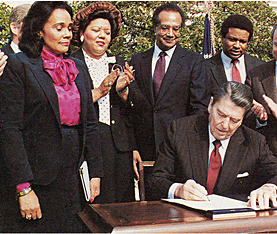
1983 – President Ronald Reagan signed a bill establishing a federal holiday on the third Monday of January in honor of civil rights leader Martin Luther King Jr.
Senator Jesse Helms of North Carolina led opposition to the holiday and questioned whether King was important enough to receive such an honor. Helms criticized King’s opposition to the Vietnam War and accused him of espousing “action-oriented Marxism”.
On October 3, 1983, Helms submitted a 300-page document to the Senate alleging that King had associations with communists.
Democratic New York Senator Daniel Patrick Moynihan declared the Helms document a “packet of filth,” threw it on the Senate floor and stomped on it.
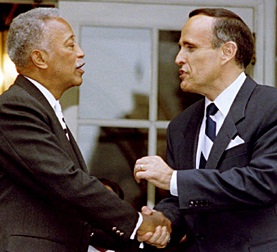
1993 – Rudy Giuliani won the New York City mayoral election.
The city was suffering from a spike in unemployment associated with the nationwide recession, with local unemployment rates going from 6.7% in 1989 to 11.1% in 1992 under Mayor David Dinkins.
Giuliani promised to focus the police department on shutting down petty crimes and nuisances as a way of restoring the quality of life.
“It’s the street tax paid to drunks and panhandlers. It’s the squeegee men shaking down the motorist waiting at a light. It’s the trash storms, the swirling mass of garbage left by peddlers and panhandlers, and open-air drug bazaars on unclean streets.”
Giuliani defeated Dinkins by a margin of 53,367 votes. He became the first Republican elected Mayor of New York City since John Lindsay in 1965.
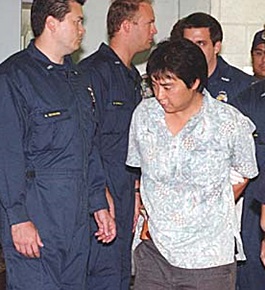
1999 – The worst mass murder in the history of Hawaii occurred in Honolulu.
Bryan K. Uyesugi, 40, an employee at Xerox Engineering Systems, arrived at work, went to the second floor and started shooting employees, killing seven of them and wounding one other.
After the shooting, he fled in a van. By midmorning, police had him surrounded near the Hawaii Nature Center in Makiki.
He held a standoff with police that lasted for five hours, during which he brandished a pistol, read magazines and smoked cigarettes.
Adding to the tension of the standoff, the Hawaii Nature Center was hosting thirty-five local school children, who were trapped inside without food or water.
Uyesugi pleaded not guilty by reason of insanity and claimed that he felt like an outcast at work and that he feared his colleagues were conspiring to have him fired.
On June 13, 2000, the jury rejected the insanity defense, finding Uyesugi guilty for the seven murders and the attempted murder.
He was sentenced to life in prison without the possibility of parole.
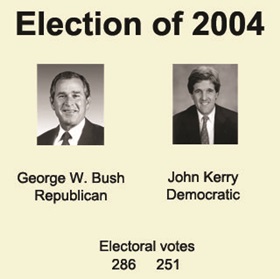
2004 – President George W. Bush was elected to a second term.
Senator John Kerry of Massachusetts waded through a large crowd of candidates to secure the Democratic nomination, while George Bush was renominated without opposition on the Republican side.
The events of September 11, 2001, and the resulting “War on Terror,” coupled with the wars in Iraq and Afghanistan, were very much the dominant themes of the campaign.
Kerry benefited from the continued absence of any evidence of “weapons of mass destruction” in Iraq and many voter’s weariness of fighting wars overseas.
Republicans repeatedly attacked Kerry, claiming he was a “flip-flopper” on several key issues. They also asserted Kerry could not be trusted to fight the war on terror.
Bush won by a slim margin, taking 50.7% of the popular vote and 286 electoral votes.
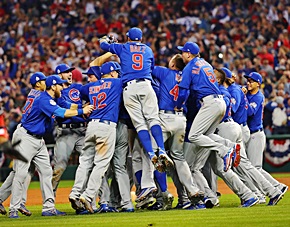
2016 – The Chicago Cubs defeated the Cleveland Indians 8–7 in 10 innings of Game 7 to win the World Series, ending the longest Major League Baseball championship drought in history.
The series was highly anticipated due to the historical ramifications. The two teams entered their matchup as the two franchises with the longest World Series title droughts, a combined 176 years without a championship.
The Cubs had gone 108 years without a championship. The Cleveland Indians had gone 68 … and they’re still waiting.
Compiled by Ray Lemire ©2023 RayLemire.com / Streamingoldies.com. All Rights Reserved.
Good Morning Ray, Like yesterday I read & enjoyed your history report but I usually put a like on the outside so I know I have read them even if I don’t comment inside. Today I’m making a quick comment now as yesterday I never added the like ’til later in the day. Have a good day. 🙂 Lee
Thanks, Lee. I am always grateful for your constant support. 🥰
Thanks Ray, really enjoy the history lessons!
Thanks, Al. I appreciate the positive feedback. I hope all is well with you and the rest of the crew. 🙂
Sometimes I get a feeling of “dejavu” from these history lessons!
I am grateful for the “good guys” and will never understand the mindset of the “bad guys”.
Thanks!
Perfectly stated, young lady. Sadly, there seems to be a never-ending supply of “bad guys” because people refuse to remember what happens when you follow them.
I thought politics couldn’t be worse today, but many of the past elections and policies seem just as divisive and mean spirited
Chock full of info
Can’t believe I entered college as a poli sci major…I graduated with an independent humanities major
Politics has been a major cesspool since time began.
I believe your major choices in college were absolutely the right ones.
A little late to this “party” however history has always been of great interest to me. You pack so much information into this and other lessons I like to take time to digest it and think about other event’s of those times. This morning presented that opportunity, darn time change. I appreciate you spending your time to provide these “lessons” for us. Enjoy your Sunday Ray.
Thank you, Marty. There has never been a time when I know I can’t count on you. Unfortunately, the fact remains that so few people read this daily excursion into our past that it is literally not worth the time it takes to compile these. As always, I appreciate your support more than I can ever say.